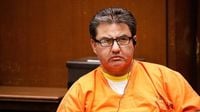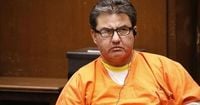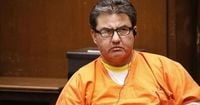On September 10, 2025, the leader of the Mexican megachurch La Luz del Mundo, Naasón Joaquín García, was indicted by a federal grand jury in New York on grave charges of racketeering conspiracy and sex trafficking, sending shockwaves through religious communities and law enforcement circles on both sides of the border. García, 56, who is already serving a more than 16-year sentence in a California prison for sexually abusing young followers, now faces a sweeping federal indictment that alleges decades of systemic sexual abuse, exploitation, and intimidation within the ranks of his church.
The indictment, unsealed Wednesday, accuses García and five close associates of weaponizing their spiritual authority, doctrine, and the very structure of La Luz del Mundo—founded in Mexico in 1926 and boasting some 5 million followers worldwide—to prey on children and women for their own gratification. According to NBC Los Angeles, the criminal activity went far beyond isolated acts: it included the production of photos and videos of child sexual abuse, trafficking of women and children, and financial crimes that funneled donations into a web of exploitation.
García’s arrest in Chino, California, where he was already incarcerated, marks only one facet of the federal crackdown. Authorities confirmed that one co-defendant was apprehended in Los Angeles, another in Chicago, while three others remain at large, their whereabouts unknown. Search warrants were executed at multiple locations in Los Angeles as part of the investigation, which, according to Homeland Security Investigations, spanned years and was bolstered by the courageous testimony of dozens of survivors.
The details in the indictment are harrowing. Prosecutors allege that García, following a pattern set by his father and grandfather—both previous “apostles” of the church—selected teens and young women under the guise of church activities, teaching them from birth that obedience to the apostle was a matter of eternal salvation or damnation. According to ABC News, this manipulation created a climate of fear so pervasive that many victims felt powerless to resist or report the abuse. Investigators said García managed a tight circle of co-conspirators who facilitated his access to victims, directed the production of child pornography, and ensured that he was never without someone to exploit.
Financial exploitation was another layer of the alleged crimes. Prosecutors claim that church donations, which followers gave in good faith, were used to fund García’s expensive travel, pay lieutenants who secured victims for him, and purchase sex toys and cleaning supplies to erase evidence of wrongdoing. The indictment further accuses two defendants and others of attempting to destroy evidence and of pressuring victims to sign false declarations denying any abuse occurred. Sermons were drafted and widely distributed that branded all sexual abuse victims as liars and reinforced the church doctrine that doubting the apostle was a sin punishable by eternal damnation.
U.S. Attorney Jay Clayton, in a statement reported by the Associated Press, did not mince words: “García and the others exploited the faith of their followers to prey upon them. When they were confronted, they leveraged their religious influence and financial power to intimidate and coerce victims into remaining silent about the abuse they had suffered.” Clayton’s remarks echoed the sentiments of many who have watched the case unfold, as the intersection of faith, power, and abuse has left deep scars among the congregation.
Ricky J. Patel, the head of the New York office of Homeland Security Investigations, described the charges as the result of “a yearlong investigation that spanned the country and involved the support of dozens of courageous victims.” Patel acknowledged the difficulty for survivors in coming forward, especially given the intense pressure and threats they faced from church leadership and loyalists.
La Luz del Mundo, which translates to “The Light of the World,” has long been a giant in the evangelical landscape, with a presence in dozens of countries and a central role in the lives of millions. Followers consider García the “apostle” of Jesus Christ, a status that prosecutors say he used to manipulate and control congregants. According to NBC Los Angeles, state prosecutors had previously accused García of using his spiritual sway to convince girls and young women that sexual acts with him were necessary for their salvation—while warning them that refusal would lead to damnation. This doctrine of obedience and fear, reinforced from childhood, made it all the more difficult for victims to break free or speak out.
After García’s initial arrest and conviction on state charges in 2022—where he pleaded guilty to two counts of sexually abusing young followers—church officials and co-defendants allegedly doubled down. Prosecutors say they tried to silence victims, destroy evidence, and even orchestrated a campaign within the church to discredit anyone who dared to come forward. The indictment details how sermons were crafted to attack victims’ credibility and to remind the faithful that questioning the apostle was itself a grave sin.
The church, for its part, did not immediately respond to requests for comment from media outlets including ABC News and NBC Los Angeles. Attorney information for García and the other defendants was also not available at the time of reporting. The silence from church leadership has only fueled speculation and concern among both critics and supporters, many of whom are struggling to reconcile their faith with the mounting allegations.
The story of La Luz del Mundo and its embattled leader has not escaped popular culture. As NBC Los Angeles noted, the church and the swirling allegations were the subject of the Netflix documentary “The Darkness within La Luz del Mundo,” which brought the issue to a wider audience and gave voice to survivors who had long been ignored or silenced.
The case is far from over. With three defendants still at large and the federal investigation continuing, authorities are urging anyone with information or who may have been victimized to come forward. The indictment represents a significant step in what prosecutors and investigators describe as a long-overdue reckoning for an institution that, for too long, allowed power and piety to shield predators from justice.
As the legal process unfolds, the eyes of millions remain fixed on the outcome—not just for the fate of García and his co-defendants, but for the future of a church now forced to confront its darkest truths in the harsh light of day.



